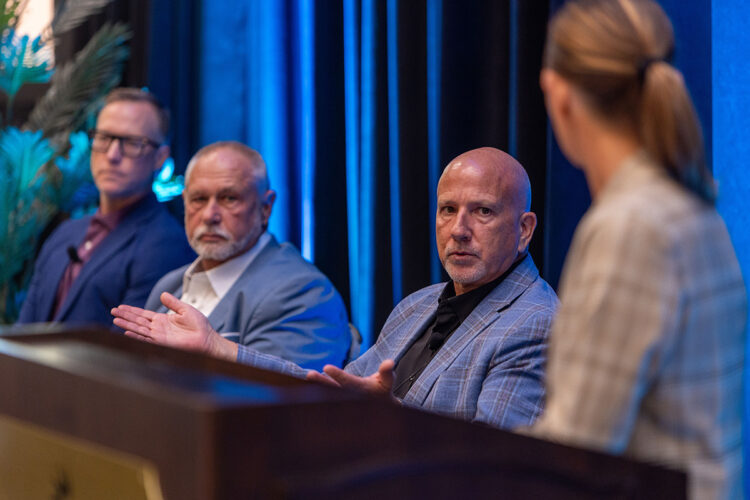The opening plenary at the E-Scrap Conference in Grapevine, Texas set out five forces that are reshaping electronics recovery: rapid device change, battery risk, compliance pressure, policy updates and AI-driven data centers.
AI growth, battery safety open E-Scrap discussions
Speakers described heavier use of automation at intake to identify devices and route them either toward testing and resale or toward dismantling and shred. Aaron Blum, chief operating and compliance officer of ERI, noted how the approach has scaled. “We’re up to about 40,000 different products in our own catalog,” he said. The conference was presented by Resource Recycling, Inc., publisher of E-Scrap News.
Amanda Tischer-Burris, vice president of OEM Solutions at Dynamic Lifecycle Innovations, said progress depends on people as much as systems, adding that success comes from empowering the team and helping staff understand risk.
Battery safety dominated the operational discussion. Facilities are expanding fire detection and suppression in high-risk zones and training in-house response teams. Tischer-Burris said Dynamic now uses a “triage based on risk, not even chemistry” to manage compromised cells before they reach shredders or transport, a shift that adds touches and slows throughput but lowers thermal risk.
Compliance concerns centered on tariffs and Basel Convention controls. Blum said his firm worked with authorities in South Korea to secure prior informed consent so precious-metal-bearing circuit boards could continue moving for refining. Panelists urged domestic processing where possible and strict downstream traceability.
Policy and extended producer responsibility (EPR) refresh also drew attention. States are revisiting weight-based goals in favor of convenience standards and exploring harmonized device lists. California’s plan to add battery-embedded products in January 2026 drew concern over unit-level weighing and data capture and over uncertainty about the covered product list. Blum called the early implementation “a real struggle.”
Panelists said AI expansion in hyperscale and corporate data centers is reducing refresh times and bringing more material into facilities. Export restrictions on advanced chips could limit reuse outside the US and emerging cooling systems will demand new handling methods. The session ended with calls for collaboration, workforce training and technology investment to match the growing scale and pace of change.
Right-to-repair talks surge forward
Right-to-repair legislation is gaining traction, with Washington and Texas solidifying measures in 2025.
“If you bought it, you own it and you should be able to fix it,” said Chris Bross, founder and president of Tierrabyte.
Since 2022, California, Colorado, Connecticut, Maryland, Minnesota, Nevada, New York, Oregon, Texas and Washington have enacted legislation related to the repair of electronic devices.
Over a third of the country by population now has some form of right-to-repair law, said Liz Chamberlain, director of sustainability at iFixit, adding that some states including Connecticut are passing without the need to advocate for action.
“The Connecticut bill was actually kind of an exciting one for us as a movement. We didn’t have a lobbyist in Connecticut. We weren’t involved in that law. It got included in the big omnibus and passed without us having to do anything. First time that happened,” she said.
In addition, the environmental benefits of extending device lifespans, such as reducing electronic waste, are becoming more evident. Most replacement parts pay off their environmental cost within days to weeks of use, Chamberlain said.
“If we as Americans kept our phones for one year longer, it would be the carbon equivalent of taking 636,000 cars off the road,” she said.
Certification and industry challenges
Jim Puckett of the Basel Action Network (BAN) and panelists discussed the organization’s newly released “Brokers of Shame” report, speaking about certification loopholes that are allowing exports to countries that have banned e-scrap imports.
The organization’s investigation indicated that some companies presenting themselves as recyclers are actually export brokers whose primary business model is packing and shipping material overseas rather than processing it domestically.
“Export brokers are not recyclers. One of the things I just explained is this is not what they’re doing even though they claim on their websites they are recyclers,” Puckett said.
Eight of the 10 brokers mentioned in the document had R2 certification, yet they were violating laws in various jurisdictions. Importing countries are parties to the Basel Convention, which prohibits such imports, while the US is not a party.
Still, certification provides a critical framework for advancing e-scrap recycling by establishing transparency standards and verifying proper end-of-life management, even as the industry continues to address existing gaps and loopholes, according to Puckett.
“I think the standards kind of bouncing off each other has raised the bar for the entire industry over time, and I’d like to see more of that happen. So I’m encouraged by that, because that means that they’re acknowledging that there’s maybe something going on here, and that we should work together,” said Emily Farrant, director of operations, GreenEye Partners.






















